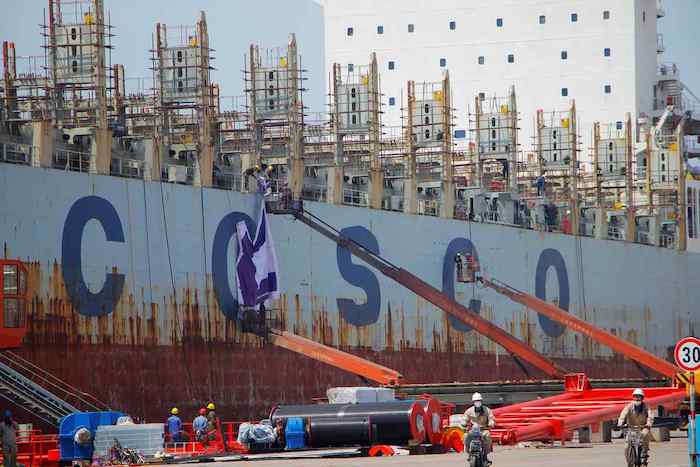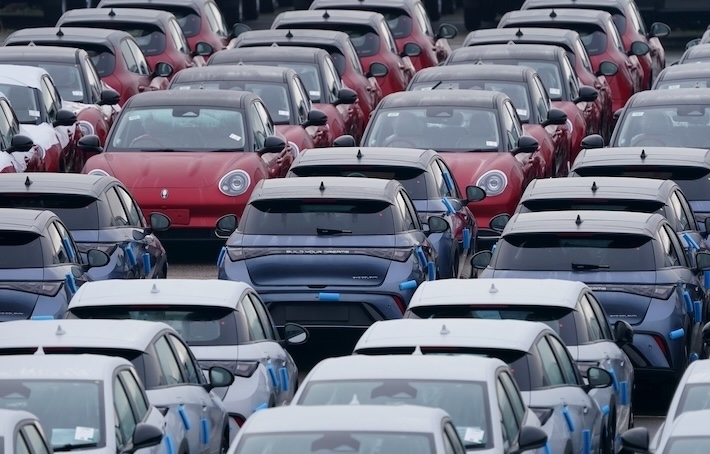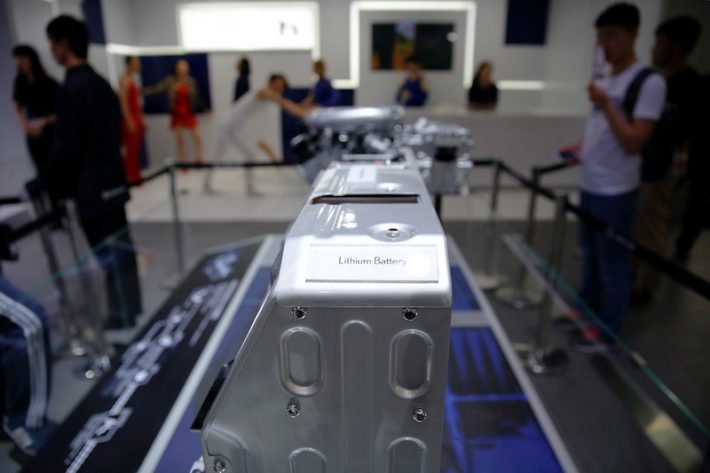China’s transport ministry on Tuesday began imposing a special port fees on ships owned or operated by US enterprises, organisations and individuals in a retaliatory move against similar levies going into effect in Washington.
“It is a justified move to safeguard the legitimate rights and interests of Chinese maritime industry and enterprises while ensuring a fair competition environment for international shipping industry,” the ministry said in a statement on Tuesday.
In details published by state broadcaster CCTV, China spelled out specific provisions on exemptions, which also include empty ships entering Chinese shipyards for repair. Chinese-built ships would be exempted from the levies.
Also on AF: China Making Exports Of Rare Earth Magnets ‘Increasingly Difficult’
The China-imposed extra port fees would be collected at the first port of entry on a single voyage or for the first five voyages within a year, following an annual billing cycle beginning on April 17.
Separately, China’s commerce ministry on Tuesday urged the US to “rectify its erroneous practices”, and pursue dialogue and consultation instead.
“If the US chooses confrontation, China will see it through to the end; if it chooses dialogue, China’s door remains open,” it said.
With similar port levies by the US against China-owned ships going into effect on Tuesday, the world’s two biggest economies seem set to return to an all-out trade war even as the two have sought to reassure traders and investors.
Last week, in response to China’s sudden expansion of its rare earth curbs, US President Donald Trump threatened to raise tariffs on Chinese goods by 100%.
‘They want to pull everybody down’
Still, officials on both sides say their negotiating teams are cooperating and can possibly find a way forward. On Monday, US Treasury Secretary Scott Bessent said tensions between the two sides had “substantially de-escalated.”
“The 100% tariff does not have to happen,” Bessent said. “The relationship, despite this announcement last week, is good. Lines of communication have reopened, so we’ll see where it goes.”
“President Trump said that the tariffs would not go into effect until November 1. He will be meeting with Party Chair Xi in Korea. I believe that meeting will still be on,” Bessent said referring to a planned meeting between Trump and his Chinese counterpart on the sidelines of of the APEC Forum in South Korea later this month.
In a separate interview with the Financial Times, however, Bessent took a more aggressive stance, accusing Beijing of trying to hurt the global economy.
“This is a sign of how weak their economy is, and they want to pull everybody else down with them,” Bessent told the FT on Monday.
“If they want to slow down the global economy, they will be hurt the most,” he added.
Tit-for-tat moves
The Trump administration announced plans to levy the port fees on China-linked ships early this year. It was aimed at loosening China’s grip on the global maritime industry and bolstering US shipbuilding.
An investigation carried out during former President Joe Biden’s administration concluded China uses unfair policies and practices to dominate the global maritime, logistics and shipbuilding sectors, clearing the way for the penalties.
Analysts expect China-owned container carrier COSCO to be most affected, shouldering nearly half of that segment’s expected $3.2 billion cost from those fees in 2026.
China, meanwhile, hit back last week, saying it would impose its own port fees on US-linked vessels from the same day the US fees took effect.
In a related move, Beijing also imposed sanctions on Tuesday against five US-linked subsidiaries of South Korean shipbuilder Hanwha Ocean which it said had “assisted and supported” a US probe into Chinese trade practices.
It also launched an investigation into how the US probe affected its shipping and shipbuilding industries.
‘A spiral of maritime taxation’
The trade war between US and China has effectively ensnared in its grip ocean shipping firms that move everything from holiday toys to crude oil.
“This tit-for-tat symmetry locks both economies into a spiral of maritime taxation that risks distorting global freight flows,” Athens-based Xclusiv Shipbrokers Inc said in a research note.
“The weaponisation of both trade and environmental policy signals that shipping has moved from being a neutral conduit of global commerce to a direct instrument of statecraft,” Xclusiv said.
Clarksons Research said in a report that the new port fees could affect oil tankers accounting for 15% of global capacity. Jefferies analyst Omar Nokta estimated that 13% of crude tankers and 11% of container ships in the global fleet would be affected.
Meanwhile, a Shanghai-based consultant who advises global companies on trade with China said the new fees may not be very disruptive to the industry and any rising costs probably would be captured in higher prices.
“What are we going to do? Stop shipping? Trade is already pretty disrupted with the US, but companies are finding a way,” the consultant, speaking on condition of anonymity, said.
- Reuters, with additional editing by Vishakha Saxena
Also read:
China Steps up Checks on Nvidia AI Chips at Major Ports
Trump’s Tariffs Spurring a Rush for New Trade Agreements
US Keen to Control More Ports, Cut China’s ‘Maritime Advantage’
CK Hutchison Rates Ports Deal With Cosco a ‘Reasonable Chance’
China Threat to Block Panama Ports Deal, ‘Wants a Cosco Stake’
China Warns CK Hutchison, BlackRock: Be Careful on Ports Deal
TransPacific Cargo Trade Decimated by Trump’s Tariff War
























